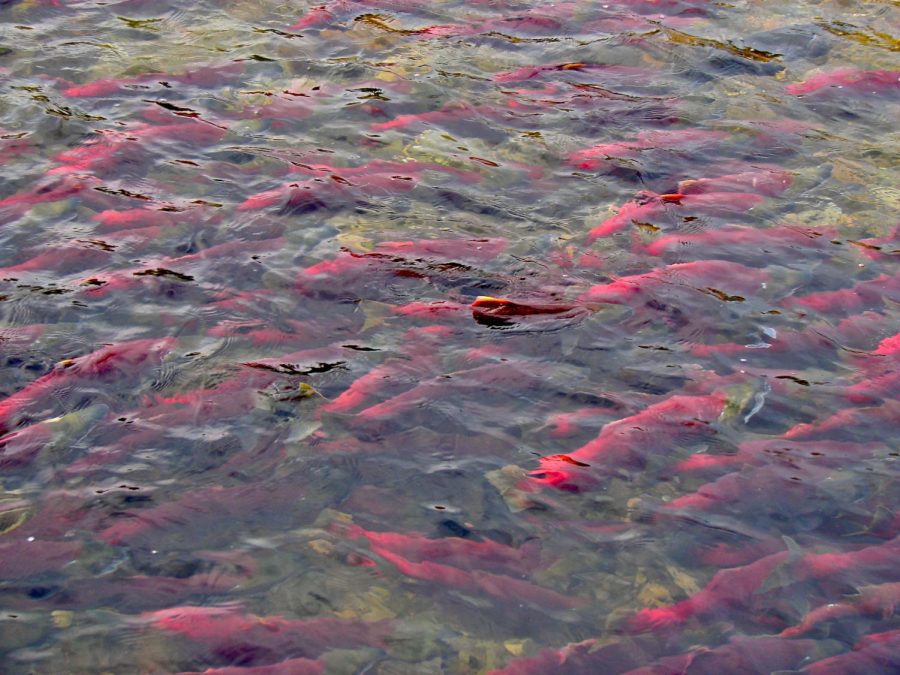Denial of Copper Mine Saves Salmon Fisheries
The rejection of the Pebble Mine Project in Alaska helped to preserve local fisheries in the area.
On November 25, 2020, the Trump Administration and the Army Corps. of Engineers rejected the Pebble Mine Project in Bristol Bay, Alaska. This is a huge win for the large salmon fishery located in the area. The salmon fishery is the largest one to exist and accounts for roughly seventy-five percent of local jobs and two hundred million dollars annually in revenue. Not only that, it provides the nation forty percent of the total salmon caught.
The Pebble Mine Project is a gold and copper mine as deep as the Grand Canyon, which produces enough waste to fill an NFL stadium roughly 3,900 times, according to the Associated Press. CEO of the Pebble Limited Partnership and one of the mine developers, John Shively, argues that “one of the real tragedies of this decision is the loss of economic opportunities for people living in the area.” He believes that the rejection of this mine is a huge business opportunity that has been lost.
However, despite the arguments Shively and his team brought up, the Trump Administration and Army Corps. of Engineers denied the permit, concluding “that the proposed project is contrary to the public interest.” The mine put the state’s billion dollar fishing industry at risk. According to Bristol Bay’s data, hundreds of millions of people would have been at risk for losing their jobs, either directly or indirectly, had the project been approved. This would have been more jobs lost than the mine could ever provide. In addition, approval of the project would have had negative impacts on consumers. Since this specific fishery provides almost half of the nation’s salmon catch, with the fishery gone, the fishing industry would have seen a huge increase in the cost of fish. Rising costs could in turn have brought decreased demand, putting the fishing industry between a rock and a hard place.
The environmental impacts of the mine would have also been prominent. The mine was proven by the Army Corps. Of Engineers to go against the Clean Water Act and the Rivers and Harbors Act. The Clean Water Act is a federal law that prevents water pollution in bodies of water throughout the United States. It’s intent was to restore the health of rivers, lakes, seas, etc. and ensure they are chemically healthy. According to Northern Dynasty Minerals LTD. (a Canadian company that owns a copper and gold mine in Alaska) the Pebble Mine Act would have potentially released liquified fossil fuels into the river, endangering aquatic life. In addition, the project would have been in violation of The Rivers and Harbors Act, the oldest federal environmental law in the United States. It prevents lakes, harbors, rivers, and several other bodies of water from being altered and filled without a proper permit and evaluation. According to Northern Dynasty Minerals LTD., the mine would have violated that act by putting the river at risk. The runoff from the mine would have “deeply contaminated” the river’s waters, making it unsafe for the fishes. Their mine would have also intruded the river in some areas, which qualifies as altering and filling. This would have directly gone against the Rivers and Harbors Act.
Notable public figures, such as Donald Trump’s Jr., were against the approval of the mine. He stated “The headwaters of Bristol Bay, and the surrounding fishery are too unique and fragile to take any chances with.” In an interview, two other Republican senators, Lisa Murkowski and Dan Sullivan (both from Alaska), also came to the same conclusion that the fishery was better off untouched. Murkowski explained,“It will help ensure the continued protection of an irreplaceable resource – Bristol Bay’s world class salmon fishery.”






